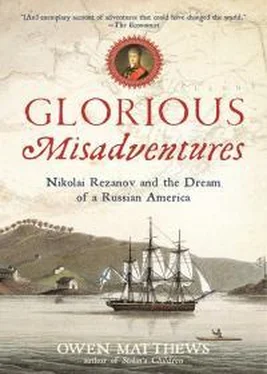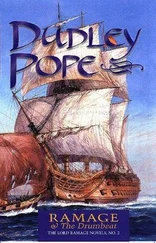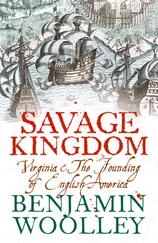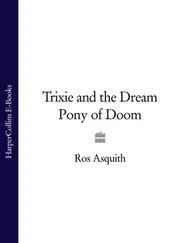‘She was lively and animated, had sparkling love-inspiring eyes, beautiful teeth, pleasing and expressive features, a fine form, and a thousand other charms, yet her manners were perfectly simple and artless,’ wrote Rezanov’s German doctor and the expedition’s natural historian, Georg von Langsdorff. For dinner the party was treated to ‘an excellent soup of pulse and vegetables, with roasted fowls, a leg of mutton, different vegetables dressed in various ways, salad, pastry, preserved fruits and many very nice sorts of food, the produce of the dairy . . . the wine, which was the production of the country, was but of an ordinary quality, but was succeeded by super-excellent hot chocolate’.12
Bullfights had been arranged for the next day, and bear-baiting. Arguello dispatched eight soldiers at dawn to find the required wild animal, and they returned at dusk dragging a large brown bear, its limbs bound and carried on a bier of stretched ox hide. Langsdorff observed the bear ‘splash about in the water to cool himself . . . No-one dared venture near him for he growled, gnashed his teeth and seemed very indignant at the treatment he received.’13 None of the Russians was tactless enough to comment that their hosts were proposing to bait their national animal to death the following day. The connection certainly did not occur to Arguello, as artless in his manners as his daughter. But in any case the poor bear died in the night, so in the end the company had to make do with traditional Spanish bulls instead.
Little did the Arguellos suspect as they drank and danced into the chilly evening that their courteous and impressive guest was viewing the rich lands of California with the envious eye of empire. Or that within a decade the southernmost outpost of Russia would be planted in modern-day Sonoma County, just seventy miles to the north of where they toasted Conchita’s future happiness.
Introduction
I shall never see you –
I shall never forget you.
Andrei Voznesensky, Junona i Avos 1
Those of depraved minds go nowadays to America solely with the aim of growing rich and then upon their return journey fritter it away in a few days, scattering like dust the riches obtained by many years of other peoples’ tears. Can such desperate people respect their fellow beings? The poor [native] Americans are, to Russia’s shame, sacrificed to their debauchery.
Nikolai Rezanov, quoted by Hieromonk Gideon2
I first heard of Nikolai Rezanov in the summer of 1986. I was fifteen years old and visiting my mother’s sister Lenina in her cluttered apartment on Frunzenskaya Embankment in Moscow. I had no inkling that I was living through the old Soviet Union’s last summer, the final months of calm before the winds of change that were to scatter the old order began to blow. Mikhail Gorbachev had come to power the previous year, and was just about to open the twin Pandora’s boxes of glasnost and perestroika . But that summer the certainties of the Soviet empire and the Communist Party had not yet been shaken by the ghosts of exhumed history, nor by unvarnished news of the unfolding Soviet defeat in Afghanistan. Orderly queues still formed outside Lenin’s mausoleum; Western cars were unknown on the traffic-free streets of Moscow, and buildings were still decorated with huge heroic posters celebrating socialist labour.
Various chaperones had been assigned by my aunt to guide me around the capital during those dusty summer holiday weeks. One of them – Victor Elpidiforovich, a war veteran who wore a pinstriped jacket with an impressive collection of medals – announced the dramatic news that tickets had been procured to Moscow’s number-one hit show, the rock opera Junona i Avos . The title is incomprehensible, even in Russian, if you don’t know that it refers to the names of two ships. But everybody in the Soviet Union did know. The show had premièred five years before, at the Theatre of Lenin’s Communist Youth League – colloquially known as LenKom – just off Pushkin Square. It had been an immediate sensation, and remained so for years: in the spring of 2013 Junona i Avos is still playing to packed houses. In the mid-1980s fans would queue for days for tickets for the performances, which occurred, with characteristic Soviet indifference to the laws of supply and demand, only once a fortnight. In those innocent days it was still considered deeply shameful to purchase a ticket at an inflated price from free-market ‘speculators’.
The show was indeed an overwhelming and moving spectacle. The story, based on historical fact but heavily embellished by librettist Andrei Voznesensky, begins with Nikolai Rezanov, a handsome Russian aristocrat and intimate of the Tsar, arriving in Spanish California with the two eponymous ships of the title. Russia’s American empire – the first time I had ever heard of such a thing – is expanding southwards, and Rezanov eyes the rich lands of California with a view to conquering them. The Spanish are depicted as religious, effete and decadent. The Russians, in their smart tsarist naval uniforms, are bluff, energetic and down to earth.
This being an opera, it is a love story. Being Russian, it’s also of course a tragedy. Rezanov and Conchita, daughter of the Spanish governor, fall in love. Her father and the Catholic priests who surround him are horrified. In the fictionalized version Conchita’s fiery Spanish fiancé – invented by the librettist – even fights a duel with the upstart Russian suitor. Rezanov’s own officers warn him that the Tsar will have to give permission for him to marry a foreigner and a Catholic. Our hero brushes aside all objections: on wings of love, he will rush to St Petersburg, petition the Tsar and return to marry Conchita. She does not dare believe it. ‘I will never see you: I will never forget you’ is the couple’s last duet, still as famous in Russia as the theme from Jesus Christ Superstar is in the West. On the road home Rezanov falls from his horse and dies. But Conchita, disbelieving rumours of his demise, continues to wait for her lover for thirty-five years. She ends her days a nun, faithful to his memory.
It’s hard to imagine today quite how extraordinary it was to see a Russian aristocrat and tsarist officers cast as heroes on a Soviet stage. The production also featured a vast icon of the Virgin looming over the actors, and haunting Orthodox liturgy. There were references to the ‘Lord Emperor’, and the tsarist flag was raised in triumph at the finale. The director, Mark Zakharov, was amazed when the censors passed the opera uncut. But Junona i Avos caught the mood of the moment. As Russians awoke to the disintegration of the Soviet empire, here was a nostalgic story of a lost empire in America. And as Gorbachev pressed for détente with the West, the romance of Rezanov and Conchita reminded us that love could cross national boundaries. Junona i Avos conjured up a romantic vision of pre-Soviet Russia even as audiences began to contemplate the reality of a post-Soviet Russia.
What impressed me most was that the story of Junona i Avos was largely true. Russia really did once have an American empire. By 1812 the border of the Tsar’s dominions was on what is today called the Russian River, an hour’s drive north of San Francisco along California’s Highway 1. Russia also – briefly – had a colony on Hawaii. Rezanov spent much of his life passionately advocating the idea that America’s west coast could be a province of Russia, and the Pacific a Russian sea. This was no mad pipe dream but a very real possibility.
As Rezanov set off from St Petersburg bound for the Pacific on a July morning in 1803, he was sailing into a world changing faster than ever in history. France, the greatest power in continental Europe, had recently been convulsed by revolution, but was now ruled by an upstart Corsican busy redrawing the map of the world. Napoleon had conquered – and then lost – Egypt, defeated Prussia and Spain and overrun Italy and much of Germany. He had even plotted with Russia’s Tsar Paul to seize India from Britain.
Читать дальше












